#desperate redoubt
Text




[Don't be played like someone else's board game. Don't be classed out like some desperate redoubt. Don't be misled, you've got a lot on your head. And nobody's gonna pay attention when you are dead, so.]
#s36e12 triple d nation - smothered#guy fieri#guyfieri#diners drive-ins and dives#board game#desperate redoubt#someone#lot#head#attention
8 notes
·
View notes
Photo
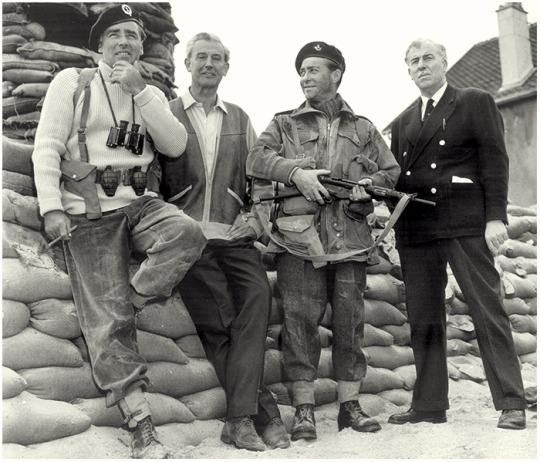
I never admitted to anybody during my entire military service that I had been an actor. I was terrified that I would be put in charge of Ensa [Entertainments' National Service Association]. Not even my closest friends knew I was an actor. I told them I was reading English at St Andrews University.
- Richard Todd
In his heyday in the 1950s and 1960s, Richard Todd was Britain’s leading matinee idol. If you love old movies, you’ll have seen Todd in one of his starring roles in “The Virgin Queen” opposite Bette Davis, “Stage Struck” with Marlene Dietrich, or “The Dam Busters” for which he won a Golden Globe Award. He was the tough little Scotsman in the wartime weepie “The Hasty Heart” and had audiences madly hunting for hankies.
Those were the days when Todd streaked across North American film screens as virtually every romantic hero from Rob Roy to Robin Hood. Ian Fleming chose him to play James Bond in “Dr. No” in 1962, but a schedule clash meant Sean Connery stepped into the role.
Little less known is the fact that he was also among the first British soldiers and the first Irishman to land in Normandy on D Day. More specifically, he participated in Operation Tonga during the D-Day landings in Normandy on 6 June 1944.
So it must have been surreal for Richard Todd the hearthrob actor to find himself playing Major John Howard in the epic movie ‘The Longest Day’ (1962) based on Cornelius Ryan’s book. Not least because he served with Howard and took part in the fighting at Pegasus Bridge that Major John Howard was tasked to secure on D Day.
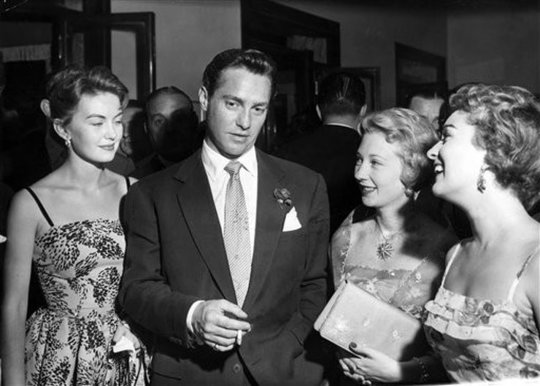
Richard Todd was born in Dublin, Ireland, in 1919. His father was a medic in the British Army and, as his posting required, the early years of his life were spent in India. The family settled in Devon upon their return to England, and Richard was educated at Shrewsbury Public School, in Shropshire. The theatre was his first love, and he furthered his dramatic skills at the Italia Conti school, thereafter moving to Scotland where he helped to form the Dundee Repertory Theatre.
When War was declared, Todd went to St. Andrew's University on the following day to volunteer. He was not a member of the University, but he not only convinced the selection unit that he was, but also added that he had been reading English there for six months, and that he had obtained a Cert A in his school cadet corps; a key point to being accepted as an officer. Despite success in passing off this invented career, Todd was to be disappointed by a lack of interest in him thereafter.
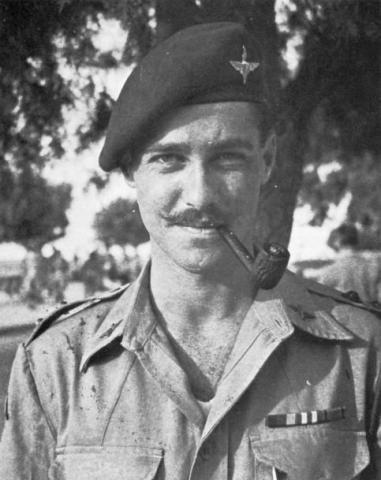
Becoming increasingly desperate to get into the War before it ended, he sent numerous letters to the War Office to press his case, which, in June 1940, was finally noticed.
Accepted by the King's Own Yorkshire Light Infantry, Todd went to Sandhurst to receive his officer training. He had a very lucky escape here when he was in a corridor on the second floor of a building when it was hit by a bomb, and he was blown into the garden outside by the blast. He got to his feet in the darkness and did not feel particularly affected by it, but an examination by torchlight revealed that his whole body was covered in blood from numerous small wounds.
A spell his hospital delayed his passing out from Sandhurst until early 1941. Celebrating in London, he narrowly avoided death again when he found his usual haunt, the Cafe de Paris, was too crowded to admit him and so he went elsewhere; it was hit by a bomb that same night and 84 people were killed.
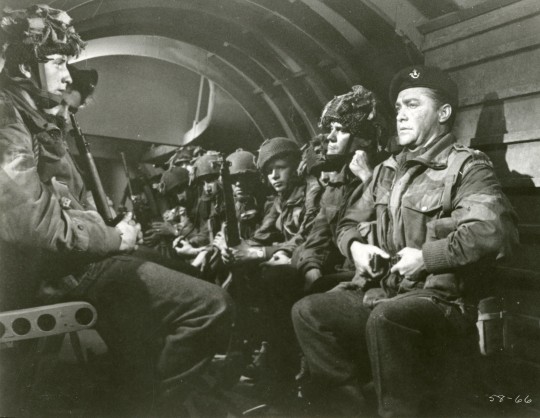
His Battalion, the 2nd/4th Battalion The King's Own Yorkshire Light Infantry, was posted to XII Corps in defence of Kent, where a German invasion if it came would almost certainly land. Todd was given command of the infantry in the Dymchurch Redoubt, a fort of the Napoleonic era mounting two six-inch guns.
In the event of an invasion, this would certainly have been a primary target for the enemy, and those manning it were told that, with the main defensive line far to their rear, they would be left to fight to the end. General Montgomery commanded XII Corps at this time, and his characteristic emphasis on training and preparedness led to the formation of the first Battle Schools. Richard Todd attended one of these, and the experience allowed him to run his own School when, in December 1941, he was sent to Iceland with the 1st/4th King's Own Light Infantry to be trained in arctic and mountain warfare.
Returning to England in September 1942, he eventually ended up in the 7th (Light Infantry) Parachute Battalion of the 6th Airborne Division. He was among troops of the 7th (Light Infantry) Parachute Battalion who, at 00:40 hours on 6 June 1944, landed behind the Normandy beaches in a cornfield, perilously close to tracer fire.
Todd scrambled into a wood and with 150 other paratroopers reached Pegasus and Ranville bridges, vital crossings to allow Allied forces to break out from the beachheads into Normandy. They had been seized by a glider force from the Ox and Bucks Light Infantry under the command of Major John Howard, who needed reinforcements to fend off ferocious German attacks.
In his memoirs, Caught in the Act, Todd would write of the carnage, “There was no cessation in the Germans' probing with patrols and counter-attacks, some led by tanks, and the regimental aid post was overrun in the early hours. The wounded being tended there were all killed where they lay. There was sporadic enemy mortar and artillery fire we could do nothing about. One shell landed in a hedge near me, killing a couple of our men.”
Todd would go on and see action at the Battle of the Bulge and push into the Rhine into Germany. After VE day, his division returned to the UK for a few weeks, then was sent on counter-insurgency operations in Palestine. During this posting he was seriously injured when his Jeep overturned, breaking both shoulders and receiving a concussion. He returned to the UK to be demobilised in 1946.
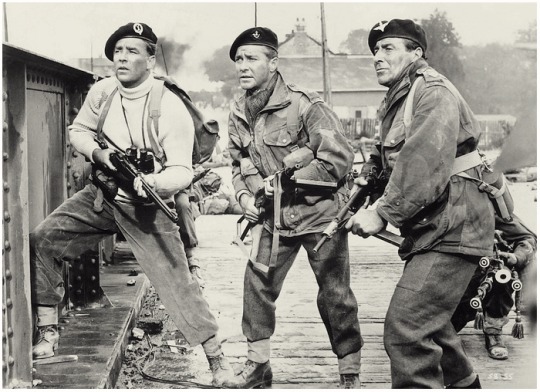
In 1962, Todd was given the part of Major John Howard in the film adaptation of Cornelius Ryan's book about the D-Day landings, ‘The Longest Day’ (1962). Due to the nature of cinema, it was impossible for the film to give a thorough reflection of the role of the 6th Airborne Division during the Invasion, and as such their activities were solely represented by a reconstruction of the capture of Bénouville Bridge by Howard's coup-de-main force. Although briefly mentioned, the role of the 7th Battalion in the defence of the western bridgehead was largely ignored, and so it appeared as if the defence of the bridge rested only on Howard's men.

Naturally, the omission of their fierce defence of Bénouville caused some resentment amongst veterans, not least because one of their own was championing this re-working of history. Todd, however, regarded ‘The Longest Day’ (1962) as a film rather than a documentary, and his part in it was simply that of an actor doing as he was told.
Richard Todd would never have guessed, that in 17 years since he was on Pegasus Bridge as a paratrooper that he would standing there again as an actor portraying Major John Howard who was given the order: 'Hold,… until relieved'. It had to be Richard Todd’s 'twilight-zone' moment.
The ‘relieve’ for Howard had to come from Lord Lovat and his troops, who had landed on SWORD Beach, and were legging it towards Pegasus Bridge.
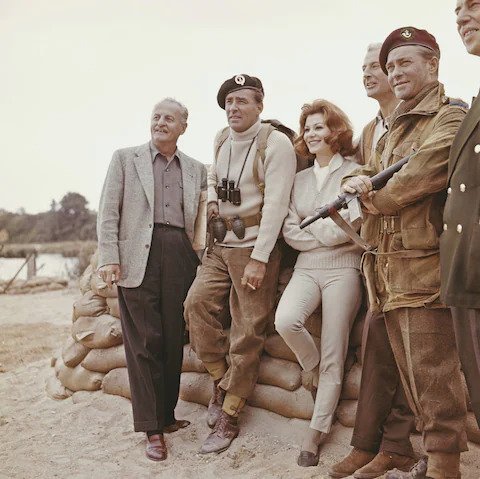
Before the shooting of the scenes were started at Pegasus Bridge, the film producer of The Longest Day, Darryl F. Zanuck, had the real life Lord Lovat and Major John Howard brought over to meet the men who were going to portray them (Peter Lawford portrayed Lord Lovat). The men had not seen each other since 6 June 1944.
Photo (above). From L-R: Peter Lawford, Lord Lovat, Richard Todd, Major John Howard.
#todd#richard todd#quote#british army#D Day#DDay#Normandy#pegasus bridge#war#second world war#major john howard#parachute#battle#actor#soldier#paratrooper#the longest day#film#movie#cinema#britain
109 notes
·
View notes
Note
sometimes i get sucked into dragon age reddit and it's so scary over there.. anyway i saw a question on /dragonage which was like what are some choices your characters made for selfish reasons so now im curious on what ur ocs did selfishly
OUGH thats a fun question...
i would say minerva makes several selfish decisions. not betraying jowan during the origin quest is selfish in its way; at this point she’s settled in the idea that there are some acceptable losses to be made for the circle to thrive, but she reacts when her friend is threatened. as for her quest decisions hmm... siding with caridin over branka is a little selfish in an odd way even though it’s the “good” choice. she’s only just really gotten into blood magic and she’s terrified of the comparison between herself and branka prioritising ends over means, so she does it more to assuage her own self-doubt than out of any real morality. that’s why it’s actually the only decision in the game where she refuses to play the diplomat and persuade her companions who question her, and she snaps at them instead
sparing loghain is somewhat selfish. she does it because she’s desperately fearful of what her own reputation will be one day if she becomes the elven blood mage who killed the hero of river dane. that’s only partly for herself though... it’s also for the sake of people like her, the hope that if she’s remembered well she might save others from the judgement that’s always loomed over her. asking loghain to do the dark ritual was almost entirely selfish though. she knew he would have died to slay the archdemon without question, knew it would be a justified end for him, a tying up of loose ends... but she couldn’t let him sacrifice himself and steal the saviour’s title she’d fought so hard for. and she didn’t want to die either! so she chose to convince him to do the ritual, which is quite something to frankly manipulate a man (who she had never forgiven for his actions but who she also did honestly consider a friend, as she only realised as she was persuading him) into doing, without ever revealing her true reasons to him. not to mention releasing an unknown magic into the world despite all her circle training and maleficar’s guilt
keir is less obviously selfish because he’s the shield, the protector, fundamentally defined by what he can do for others. but leaving bethany behind for the deep roads expedition, not because she couldn’t handle it but because he couldn’t risk losing another sibling to the darkspawn, was selfish. or he thinks so afterwards, anyway. it’s hard to say in the end whether he did things to protect people or because he was afraid. as a rule there’s a fundamental selfishness to the way he is with his own people; anyone else’s loss is justifiable for them. he and anders sometimes fight bc ultimately keir can’t match justice’s absolute dedication, he would sacrifice the cause of mages to see his and only his people safe, he’s only a man and that’s who he is. it’s kind of a moot point bc half his loved ones are mages who will never be safe until they’re free, but it is also arguably what he’s doing in the act 2-3 break and the act 3 on the loose quest when he’s effectively shackled by meredith and hunting blood mages for her, bc she has bethany, and bc she can’t not know abt anders and merrill
i’ve always been charmed by da2’s description of reaver mechanics as “selfish sacrifice”, so that’s another one for keir, too
siding with the templars was a little selfish for helena. she did go to redcliffe at fiona’s invitation—she made that much effort, to placate her brother’s ghost—but ultimately it went too far for her pride to save those who had sold themselves to magisters, when the templars were also at hand. and she wanted so badly to believe for her own sake that there was something salvageable in the order. so she went to therinfal redoubt and told herself they would see what could be done for the mages once the breach was sealed
#minerva surana#keir hawke#helena trevelyan#i wouldnt say theyre my most selfish characters.#minerva has lofty goals in mind always. keir’s care for others is his most fundamental trait. helena has her sense of honour#one of my hawkes mairi is designed for selfishness to be her fundamental trait and im super excited to play that#long post
34 notes
·
View notes
Text
https://www.washingtonpost.com/world/2023/11/10/israel-dahiya-doctrine-disproportionate-strategy-military-gaza-idf/
Ishan Tharoor
10 November 2023
Comment:
While the statistics are dated, this is an influential discussion of the way Israeli national security precepts and assumptions appear to have been translated into military tactics among some top officials - an approach termed the 'Dahiya Doctrine'
Article:
A few days after Hamas’s horrific Oct. 7 rampage through southern Israel, a top Israeli military official was blunt about his nation’s military response. Israeli security officials repeatedly stress the steps they take to minimize civilian harm and claim they are only striking legitimate military targets. In recent days, Daniel Hagari, spokesman of the Israel Defense Forces, accused Hamas of “cynically” deploying its assets in civilian areas and near critical infrastructure, like hospitals. But when speaking in the offensive’s early stage, Hagari revealed that the “emphasis” of the IDF’s reprisal was “on damage and not on accuracy.”
At that time, Israeli warplanes had already dumped hundreds of tons of bombs on targets in the Gaza Strip. The ongoing campaign in the month since has claimed more than 10,000 lives in the besieged territory, including those of more than 4,000 children. It’s triggered a humanitarian crisis, displacing the bulk of Gaza’s 2.3 million people and driving tens of thousands into a desperate search for food, safety and water. Hunger and disease stalk Gaza’s blasted neighborhoods. Aid agencies place little hope in Israel’s latest decision to offer four-hour “pauses” in its operations so that residents in north Gaza can trek southward.
There are reams of commentary on what Israel’s strategy and endgame may be as it seeks to nullify the long-standing threat posed by Hamas and purge the Islamist militant faction from its Gaza redoubts. But looming behind it — and implicit in Hagari’s “emphasis” on damage over accuracy — is a long-standing Israeli military doctrine that appears to be in play now.
The so-called “Dahiya Doctrine” took shape in the wake of the bruising 2006 war between Israel and Hezbollah in Lebanon. Dahiya refers to the southern Beirut suburbs where Hezbollah maintained its strongholds and which were pummeled by Israeli jets after hostilities began when Hezbollah fighters abducted two Israeli soldiers.The onslaught then took Hezbollah by surprise, whose senior leadership had not expected to see their headquarters turned into rubble nor had planned for such a relentless bombardment. “I said that we shouldn’t exaggerate, that Israel will just retaliate a bit, bomb a couple of targets and that would be the end of it,” a Hezbollah operative told former Washington Post reporter Anthony Shadid in 2006.
The doctrine that emerged out of the conflict was most famously articulated by IDF commander Gadi Eisenkot. “We will wield disproportionate power against every village from which shots are fired on Israel, and cause immense damage and destruction. From our perspective, these are military bases,” he told an Israeli newspaper in 2008. “This isn’t a suggestion. This is a plan that has already been authorized.”
Around the same time, former Israeli colonel Gabriel Siboni wrote a report under the aegis of Tel Aviv University’s Institute for National Security Studies that argued the necessary response to militant provocations from Lebanon, Syria or Gaza were “disproportionate” strikes that aim only secondarily to hit the enemy’s capacity to launch rockets or other attacks. Rather, the goal should be to inflict lasting damage, no matter the civilian consequences, as a future deterrent.
“With an outbreak of hostilities, the IDF will need to act immediately, decisively, and with force that is disproportionate to the enemy’s actions and the threat it poses,” he wrote. “Such a response aims at inflicting damage and meting out punishment to an extent that will demand long and expensive reconstruction processes.”
The doctrine appeared to be in operation during a round of hostilities between Hamas in Gaza and Israel at the end of 2008 and beginning of 2009. A U.N.-commissioned report regarding that conflict, which saw the deaths of more than 1,400 Palestinians and Israelis, determined that Israel’s campaign was “a deliberately disproportionate attack designed to punish, humiliate and terrorize a civilian population, radically
diminish its local economic capacity both to work and to provide for itself, and to force upon it an ever increasing sense of dependency and vulnerability.”
The doctrine endured in the years since. “Israeli military correspondents and security analysts repeatedly reported that the Dahiya doctrine was Israel’s strategy throughout the war in Gaza this past summer,” observed Palestinian American scholar Rashid Khalidi in the fall of 2014, after another Israeli campaign left more than 1,460 civilians dead, including almost 500 children. “Let us be frank: this is actually less of a strategic doctrine than it is an explicit outline of collective punishment and probable war crimes.”
He added: “Not surprisingly, one found little mention of the Dahiya doctrine whether in statements by U.S. politicians, or in the reporting of the war by most of the mainstream American media, which dwelt on the description of Israel’s actions as ‘self-defense.’”
In the present environment, Israel’s right to self-defense has indeed been championed by lawmakers and commentators across the West. Given the unprecedented scale and horror of the Oct. 7 attack, there appears to be a hardened consensus in Israel that its military should do whatever it takes to neutralize Hamas. To that end, a host of Israeli politicians have called for the wholesale destruction of Gaza, the depopulation of the territory and even its resettlement by Israel.
Eisenkot is now a member of Israel’s unity “war cabinet.” No Israeli politician or security official has explicitly invoked the “Dahiya doctrine” as a template for the destruction unleashed in Gaza.
“I don’t think this doctrine applies today,” Siboni, now of the Jerusalem Institute for Strategy and Security, told French newspaper Le Monde last month, arguing that everything Israel is targeting are explicitly military targets.
Siboni added that Israel’s efforts to coax Palestinians in northern Gaza to flee to the south was a sign of its humanitarian approach. “As for those who remain, too bad,” he told Le Monde. “They choose to put their lives on the line.”
2 notes
·
View notes
Text
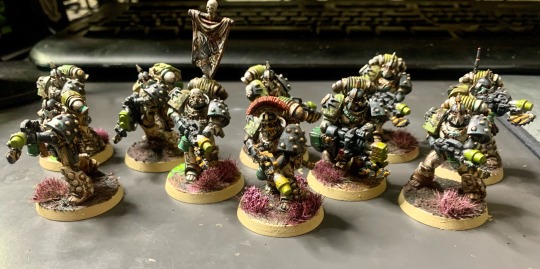
The Thorns of Barbarus.
Barbarus is a world of desolation, of poisoned air and burning winds. Of fog and grime, of despair.
The Thorns call back to the long march up the passes to kill the sorcerer overlords with Mortarion himself. They never forgot the clouds of death. The failure and the success. They left the world the Death Guard, but the bitterness of a victory stolen never allayed.
They wield throwers of toxic, nuclear flame, of poisoned gas, and lazily toss rad grenades into the trench and the redoubt.
They serve the Lady if Thorns, their champion, in a ceaseless graining war, desperate for deaths Release but unable to achieve it at their own hand. Bitter duty requires them to die in a miasma of death and black fire, after burning the flesh from as many as they can. Payment for their own failure.
14 notes
·
View notes
Text



TESFEST2023 - Day 6 - Blood
For the Blood theme, I would like to share an idea that has been incubating for a while. It may make it into Mage Apprentice along the theme of Blood Magic, or it may end up its own mod. Or maybe it will end up in the bin of intriguing ideas that didn't become reality. We will see.
The story of the Blood Sisters would revolve around fleshing out the Forsworn culture, back story, and answer questions such as 'where does their affinity with Hagraven come from?', 'how did Briarhearts come about?' or 'where are the children?'.
Most importantly, it would give the player a chance to join the Forsworn, experience their culture and discover their image of blood thirsty savages is nothing more than propaganda from the Empire.
[Images generated with Stable Diffusion and InvokeAI. These are placeholders until I create the NPCs in-game]
More details after the break if you don't mind spoilers for the story.
The Blood Sisters would be three powerful holy women, each leading a different tribe of Forsworns (I saw something about multiple Forsworn tribes once but I can't find that web article again).
The Blood Elder is an old woman with white hair, as close to a Hagraven as possible without becoming one. She rules the southern side of the Reach, centered on Bards Deep Summit.
The Blood Mother is a pregnant middle age woman with white hair, who rules the Deepwood Redoubt enclave.
The Blood Maiden is a young woman with white hair, barely out of her teens. She rules most of the Reach and centered on Karthspire.
--
Crushed between the Nords on side and the Empire on the other, the Forworns were facing extinction - of their people and of their culture.
Their true leader, Enid, a young holy woman with white hair, barely out of her teens, took desperate measures to ensure the survival of her people.
Tapping into an ancient blood magic ritual, she split herself into three versions of herself at a different age.
The Maiden would be perpetually young - idealist, fierce and fearless. She would lead her people in merciless attacks against the enemies of her people.
The Mother would look perpetually pregnant, as she would carry in her womb the souls of all of their children placed there for safekeeping.
The Elder would be perpetually wise and would come up with powerful alliances with Hagravens, Flame Atronach and other creatures. She would instruct her people in dark rituals (Briarhearts).
One thing Enid did not anticipate is that her three self would not agree to a common strategy and would split the Forsworns into three tribes.
The role of the player would be to meet each one separately, discover they are one and the same, and reunite them into a joint council.
And Madanach in all this? The King in rags would be actually a puppet. A diversion to distract their enemies (and it worked, since they jailed him for it).
--
Culturally, I would model the Forswon after Celtic influences, like what the Picts were to the Roman Empire. That would make sense given their relationships to Bretons.
I still have a lot of research to do before fleshing this story out but it feels right so far, and it could evolve into the missing 'join the Forsworn' quest I have been looking for.
4 notes
·
View notes
Text
A New Dawn
Pact Commander Siggi Vilodsdottir woke up at her usual early morning time, but the light peeking through the flap of her tent was - different. Wait, of course. Sun's Refuge. The exhaustion of actually getting the damn place up, or just leftover grogginess from her first night of decent sleep in ages, had momentarily made her forget, to expect the sun outside her tent flap.
No, these were caves, and it would be cave living for a while. As they formulated a way to take care of Kralkatorrik, they had made the subterranian lair their home - The massive Elder Dragon could never dig this deep, and even his smaller minions would find themselves hard pressed to pass through the narrow redoubts and defeat the magical defenses left by Sunspears past - now reactivated in service of Sunspears present - so here they remained, for the moment. The light from the giant braziers, reflected off the crystals, natural and brand alike, embedded in the walls, certainly made for adequate light, but it wasn't quite the same as the wide, wild sun.
Still, If anyone knew how to live without the sun, it was the Norn.
Pulling on a Jerkin, Siggi stood and threw back the flap of her tent, eager to find something to break her fast - perhaps the foragers had found some good venison - when she nearly tripped over it. A wreath.
A wild grin broke across her face. That dork. He was really going to do this proper, wasnt he? She reached down, ready to pluck it off the ground, but about halfway there, she hesitated as something caught her attention, a quick movement out of the corner of her eye. She looked up. Yes. There, behind that rock column. Trying VERY hard, and failing nearly as hard, to look inconspicious, was Braham Eirrson himself.
She hesitated, not out of second thoughts, but just because the boy could probably stand to sweat a bit. Good for his humility. Wasn't right for a Norn to hold a grudge long as he did.
Then again, she was Norn too, huh? And there was another way to handle this...
Finally, she turned back into her tent - but only for a moment, snatching up her best travelling stein. As she exited again, she saw Braham, who had been hunched over, suddenly straight again, looking desperately, wildly at her.
She plunked the stein down in the center of the wreath, crossed her arms, and raised an eyebrow at him. Braham coughed, nodded, and slunk off.
***
A few hours later, after she'd had a chance to eat and answer about 1000 different questions from various Pact Officers and Sunspears, help out a few Refugees, and discuss possible dragon tracking measures with Taimi and her boys, she finally came to the Vigil tents, where everyone had pooled what alcohol they had for a kind of tavern of sorts, a place to go to take a break, relax, and, if needed get just a bit drunk, to take the edge off. Braham was sitting at the end of one of the longer, less populated benches, and Siggi stopped at the the makeshift bar just long enough to grab their first round - Iron Legion Ale, Charr Beer. Almost as good as Ice Ale from the Wayfarer Foothills, in a pinch. As She walked up to Braham, Steins balanced in hand, he had just finished glaring down a poor Vigil soldier who looked like they were coming to sit across from him. Siggi chuckled, more at Braham's seriousness than the poor Soldier's misfortune, and easily slipped in across from the other Norn.
"Hey Kid. Shake off the Spiders yet?"
"What!? N- I mean Yes- I mean, it's fine why would I care about Spiders? We killed them all! Er, we did kill them all, right?"
Siggi couldn't help herself, breaking into an uproarius laugh at Braham's attempts to keep a slight panic under control, "I'm sorry Braham, I just teasing! If there's any spiders left, I'd imagine they're staying hidden for good, after the drubbing we gave their queen."
Braham nodded, blushing slightly with embarassment, "Oh. Yeah, It's fine. Spiders are gone."
Siggi pushed one of the steins toward Braham, "Iron Legion Ale. Not as good as a good Wayfarer Ice Brew, but beggars can't be choosers."
Braham took the Stein gratefully and took a huge gulp straight away. Siggi smirked again and followed suit.
As they set their mugs down, Braham cleared his throat, "So. How many mugs of these do you think we'll need to put this behind us?"
"Eh," Siggi waved a hand dismissively, "It's all snowmelt, far as I'm concerned. I forgave you a long time ago, just needed you to come around."
Poor Braham made a confused face, "Then Why not take the wreath in?"
"Listen," Siggi continued, with a small smile, "I gave you the Stein in the wreath for a couple reasons. One, I wanted an excuse to drink, and two, it's been way too long since we just sat down and TALKED, you know?"
"Oh. Yeah. I guess it has, huh?"
So they talked, avoiding the subject of their fight for the moment, speaking of Braham's adventures in the High Shiverpeaks, of Siggi's own adventures combating Balthazar - most of it he had heard second hand, but he wanted to hear it from Siggi. Ale after Ale appeared before them, and by the time conversation wound down, Siggi could confidently declare herself pleasantly tipsy, warm and buzzing down to her toes, and judging by Braham swaying on the bench across from her, he was somewhere in the same steading.
"Huh," he chuckled, "Imagine if I hadn't been such a Dolyak's ass. Could have helped you take down a human God. That would have been something to see."
Siggi chuckled, "Maybe. Then again, I did have to die to do it."
Braham frowned, "And maybe if I was there, I could have stopped him from killing you. I AM sorry, Commander..."
"Hey." Siggi set down her stein again for a moment, staring seriously across the table, "Already forgiven, remember? Wreath-sworn. Besides, Losing a parent affects a lot of us pretty badly."
"Hell. Losing my Mom probably affected you, huh?" Braham murmured, staring at the table, "I've been thinking about that, lately. She was your mentor. You two hunted together, built a legend together, she even sponsored you into the Pact."
Siggi nodded, "Yeah. She was... special, to me."
"And you kept on anyway."
"I did. I had a lot of people to save. If I had stopped to mourn her, how many more would have been lost?"
Braham took an especially long swig of ale after that, stared off into the middle distance.
"I... wonder if maybe the real problem was... I was jealous of you. You were closer to her than I was. Eir handpicked you as a champion of the great hunt. She recommended you to the orders, sheparded you until you were a force to defeat an elder dragon on your own. Hell, she was almost more of a Mom to you than she was to me."
Siggi raised an eyebrow, "C'mon, I'm not THAT much younger than her. Eir was more like..."
Siggi paused for a moment. Her mind flitted back, as it often did, to a certain night by a campfire, a night in while the bitter cold of the Shiverpeaks pierced even the hardy hides of the norn, and they found it prudent to share a bedroll for warmth. But then, prudency gave way to an awareness of bare skin touching skin, of a desire that no longer seemed worth hiding. No, Braham wasn't ready for that story. She wasn't sure she'd ever share that with anyone else anyway.
"...Let's just say, cool older sister?"
Braham chuckled, "Huh. yeah, that makes sense. And I guess I'd describe you the same way."
"That's me, cool older sister to thousands of squabbling pact children." Siggi raised her stein one last time and drained the current contents, a far-too-weak human brew. Really had to strengthen the supply lines here if they were already down to the human-brewed stuff, she thought absent-mindedly.
#guild wars 2#braham eirsson#living world season 4#norn commander#eir stegalkin#gw2#fanfic#this feels more like a fragment than a full fanfic#but i just like the idea of braham and a norn commander getting in a proper norn apology and talking about eir
14 notes
·
View notes
Text
The poet Jean Tortel, one of the regular collaborators of the Cahiers du Sud, has left the following rather overwritten description of her at this time:
A kind of body-less bird, withdrawn inside itself, in a large black cloak down to her ankles that she would never take off, still, silent, at the end of an old settee where she would sit alone - a settee overloaded with books and magazines - alien yet attentive, both observant and distant. Letting us talk, she was often deeply plunged in some book, reading in the midst of conversations from which she seemed absent. She was a presence, someone who was simply there, unusual and perhaps incomprehensible. A stranger amongst us, redoubtable (and a little feared). Extremely ugly at first sight, a thin and worn face under her large black beret, straight hair, an absent body, with only heavy black shoes to be seen beneath the cloak, she would look (whenever she did look) through her spectacles, her eyes very much to the fore as also her head and her bust, centring on the thing she watched with her invasive short-sightedness, with an intensity and also a kind of questioning eagerness that I have never encountered elsewhere... She did not let us go. The eagerness in Simone Weil's eyes was unbearable. In her presence, all 'lies' were out of the question. But I also sometimes felt the need simply to escape from her denuding, tearing and tom eyes which would swallow up and leave helpless the person she was looking at, transported against their will into the depths of Being. Yet this eagerness was balanced, and somehow contradicted, (as well as multiplied), by the imploring expression of her mouth, her large humid lips seemed to be endlessly making a request which was both smiling and desperate... She spoke with a calm, soft voice, slowly, revealing her slightly decayed teeth. It was as though she wanted to encircle and keep her interlocutor with her - as though, I sometimes thought, she was trying to wrap him up. But she spoke to very few people. She was there. Thus in the attic of the Cahiers where on certain evenings people crowded in, she was both the essential distance and the essential presence.
David McLellan, Utopian Pessimist: The Life and Thought of Simone Weil
16 notes
·
View notes
Text
Day 46 - 100 Warm-Up Roleplaying Questions
Every day I use an RNG to pick a question from this list and answer it as four of my dnd characters: Hanne, a human bard; Gat, an orc rogue/warlock; Cogwynn, a half-elf paladin; and Shadow of a Star, a tabaxi wizard.
Today's number is: 75
75 If your character had the chance to rename the party/give the party a name, no questions asked, what would it be?
Hanne: Hmm, The Redoubtable Red Wolves? The group comes from a clan known as the Wir-Wolves, and they all have red hair, and alliteration is awesome. I don't think our group really has a name?
Gat: [Current name is The Number One Team, which is hilarious and great.] Considering that he's from Fantasy!France and not particularly imaginative, he'd probably call the group Tueurs de magie or Magic Killers. The party has been dealing with many magic eaters - creatures made of magic/elements that devour magic, which they kill. (Though he is sure that Sialuk, Ranee, or Yukon would quickly point out that killing sentient creatures or people is wrong and not something to be done without due cause.)
Cogwynn: The Gripping Hand. The group doesn't currently have a name, but this has some great allusions to Cogwynn's God, Torm, as well as some of the maybe less savory members' tendency to get a grip on things that aren't theirs and the possible future desperateness of the party.
It also alludes to an alien race from classic sci-fi, which just pleases the nerd in me.
Shadow of a Star: Not applicable
2 notes
·
View notes
Text
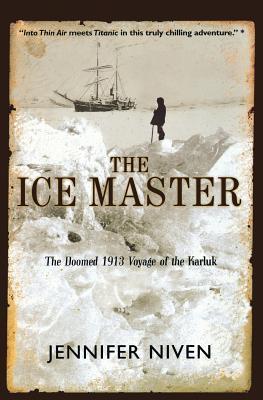
The Ice Master by Jennifer Niven (2000)
“It was to be the greatest and most elaborate Arctic expedition in history, with the largest scientific staff ever taken on such a journey. Its leader, Vilhjalmur Stefansson, was celebrated for his studies of Eskimo life and, with this mission, hoped to find evidence that proved his staunchly held belief that there was a last unexplored continent, hidden beneath the vast polar ice cap.
“In June 1913, the H.M.C.S. Karluk set sail from the Esquimalt Naval Yard in Victoria, British Columbia. Six weeks later, the Arctic winter had begun, the ship was imprisoned in ice, and those on board had been abandoned by their leader.
“For five months, the Karluk remained frozen in a massive block of ice, drifting farther and farther off course. In January 1914, with a thunderous impact, the ice tore a hole in the vessel's hull, and the redoubtable captain, Robert Bartlett, gave orders to abandon ship.
“With nothing but half the ship's store of supplies and the polar ice beneath their feet, Captain Bartlett, twenty-one men, an Inuit woman and her two small daughters, twenty-nine dogs, and one pet cat were now hopelessly shipwrecked in the middle of the Arctic Ocean, hundreds of miles from land. These castaways had no choice but to try to find solid ground where they could wait while they struggled against starvation, snow blindness, a gruesome and mysterious disease, exposure to the brutal winter — and each other.
“Bartlett and one member of the party soon set across the ice to seek help. Nine months later, twelve survivors were rescued by a small whaling schooner and brought back to civilization.
“The Ice Master is an epic tale of true adventure that rivals the most dramatic fiction. Drawing on the diaries of those who were rescued and those who perished, and even an interview with one living survivor, Jennifer Niven re-creates with astonishing accuracy and immediacy the Karluk's ill-fated journey and her crew's desperate attempts to find a way home from the icy wastes of the Arctic.”
2 notes
·
View notes
Photo



This is from a much later ep but I am posting them because I just had a revelation that would make sense to pretty much nobody among my followers because only like 8 of them have any interest in Aziz and I am not sure there is any overlap between you awesome guys and people who’ve read and loved Emile Zola’s Au Bonheur des Dames (The Ladies’ Paradise), one of my all-time favorite books.
That novel was the basis for the British show Paradise which I hated hated HATED. It may have been a decent show on some other terms but it was a truly terrible adaptation - horrifically miscast and the feelings is utterly off. Ugh ugh I like to forget it exist.
But anyway - after Aziz, Murat Yildirim and Simay Barlas looking the way they do in Aziz are 100% my headcanon for Mouret and Denise.
We have the age difference and the suits and the strong-willed beautiful younger working class woman driving the upper class man who doesn’t think he could ever love her insane with longing. I mean, Simay is not blond and the set up is somewhat different - Mouret is a playboy genius businessman who finds himself drawn to a beautiful shopgirl he hired. But she refuses to be his mistress (and he cannot imagine her as a wife) and he starts losing it in desperation and meanwhile the aristocratic woman his age he was courting is seeing all this unfold. This is 100% who are my headcast now.
I mean, look at this bit:
He said no more; but he was still looking at her in her simple black dress and bonnet trimmed with a strip of blue ribbon. Was this little savage going to turn out a pretty girl? She looked all the better for her day in the open air, quite charming indeed with her splendid hair waving over her forehead. And he, who during the last six months had treated her like a child, sometimes giving her advice, yielding to a desire to inform himself, to a wicked wish to know how a woman grew up and became lost in Paris, no longer laughed, but experienced a feeling of surprise and fear mingled with tenderness. No doubt it was a lover who was improving her like this. At this thought he felt as if pecked to the heart by a favourite bird, with which he had been playing.
The novel totally had hair fixation too ahaha.
Anyway, I conclude on a passage which sums up their dynamic and is one of the reasons it was a fave of mine....
Mouret, meanwhile, was living in anguish. Was it possible that such a child could torture him in this manner? He could always recall her arrival at The Ladies' Paradise, with her heavy shoes, thin black dress, and wild look. She stammered, they all used to laugh at her, he himself had thought her ugly at first. Ugly! and now she could have brought him to his knees by a look, for he thought her nothing less than an angel! Then she had remained the last in the house, repulsed, joked at, treated by him as a curious specimen of humanity. For months he had wanted to see how a girl sprung up, and had amused himself with this experiment, not understanding that he was risking his heart. She, little by little had grown and become redoubtable. Perhaps he had loved her from the very first, even at the time when he had thought that he felt nothing but pity for her. And yet, he had only really begun to feel this love on the evening of their walk under the chestnut trees of the Tuileries. His life dated from then; he could still hear the laughter of a group of little girls, the distant fall of a jet of water, whilst in the warm shade she walked on beside him in silence. After that, he knew no more, his fever had increased hour by hour; all his blood, his whole being, in fact, had been given to her. And she, such a child—was it possible? When she passed by now, the slight gust from her dress seemed to him so powerful that he staggered.
For a long time he had struggled, and even now he frequently became indignant and endeavoured to free himself from this idiotic possession. What power was it she possessed that she should be able to bind him in this way? Had he not seen her without boots to her feet? Had she not been received almost out of charity? He could have understood had it been a question of one of those superb creatures who charm the multitude! but this little girl; this nobody! She had, in short, one of those insignificant faces which excite no remark. She could not even be very intelligent, for he remembered her bad beginning as a saleswoman. But, after every explosion of anger, he experienced a relapse of passion, a kind of sacred terror at having insulted his idol. She possessed everything a woman can have that is good—courage, gaiety, simplicity; and from her gentleness a charm of penetrating, perfume-like subtlety was exhaled. One might at first ignore her, or elbow her like any other girl; but the charm soon began to act with invincible force; and one belonged to her for ever, if she deigned to smile. Everything then beamed in her white face, her soft eyes, her cheeks and chin full of dimples; whilst her heavy blonde hair also seemed to light up with a royal and conquering beauty. He acknowledged himself vanquished; she was as intelligent as she was beautiful, her intelligence came from the best part of her being. Whilst in his eyes the other saleswomen only possessed a superficial education, the varnish which scales off from girls of that class, she, without any false elegance, retained her native grace, the savour of her origin. The broadest commercial ideas sprang up from her experience, behind her narrow forehead, whose pure lines clearly announced the presence of a firm will and love of order. And he could have clasped his hands to ask her pardon for blaspheming in his hours of revolt.
Why did she still refuse with such obstinacy? Twenty times had he entreated her, increasing his offers, offering money and more money. Then, thinking that she must be ambitious, he had promised to appoint her first-hand, as soon as there should be a vacancy. And she had refused, and still refused! For him it was a stupor, a struggle in which his desire became rageful.
All his days were now spent amidst the same grievous obsession. Denise's image rose with him. After he had dreamed of her all night, she followed him to the desk in his office, where he signed the bills and orders from nine to ten o'clock: a work which he accomplished mechanically, never ceasing to feel her present, still saying "no," with her quiet air. Then, at ten o'clock, came the board-meeting, quite a cabinet council composed of the twelve directors, at which he had to preside; they discussed matters affecting the in-door arrangements, examined the purchases, settled the window displays; and yet she was still there, he heard her soft voice amidst the figures, he saw her bright smile amidst the most complicated financial situations. After the board-meeting, she accompanied him on the daily inspection of the departments, and returning with him to his office in the afternoon, she remained close to his chair from two till four o'clock, whilst he received a crowd of important business men, the principal manufacturers of France, bankers and inventors: a continual coming-and-going of the wealth and intelligence of the land, a mad dance of millions, rapid interviews during which the biggest affairs of the Paris market were concluded. If he forgot her for a moment whilst he was deciding to ruin or support an industry, he found her again at a sudden twitch of his heart; his voice died away, and he asked himself what could be the use of this princely fortune since she still refused. At last, when five o'clock struck, he had to sign the day's correspondence, and the mechanical working of his hand began again, whilst she rose up before him more domineering than ever, seizing him entirely, to hold possession of him throughout the solitary and ardent hours of the night. And the morrows were the same days over again, days which were so active, so full of colossal labour but which the slight shadow of a child sufficed to ravage with anguish.
However, it was particularly during his daily inspection of the departments that he felt his misery. To have built up this giant machine, to reign over such a world of people, and yet to be dying of grief because a little girl would not accept him! He scorned himself, dragging the fever and shame of his pain about with him everywhere. On certain days he became disgusted with his power; from one end to the other of the galleries he felt nothing but nausea. At other times he would have wished to extend his empire, and make it so vast that she would perhaps have yielded out of sheer admiration and fear.
Or this bit is even better:
"Good heavens! I love you! I love you! Why do you delight in tormenting me like this? You can see that nothing else exists for me, that the people I speak about only touch me through you, that you alone can occupy my thoughts. Thinking you were jealous, I gave up all my pleasures. You were told I had mistresses; well! I have them no longer; I hardly set foot outside. Did I not prefer you at that lady's house? have I not quarrelled with her in order to belong solely to you? And I am still waiting for a word of thanks, a little gratitude. And if you fear that I should return to her, you may feel quite easy: she is avenging herself by helping one of our former salesmen to found a rival establishment. Tell me, must I go on my knees to touch your heart?"
He had come to this. He, who did not tolerate the slightest peccadillo among the shopwomen, who turned them out for the least caprice, found himself reduced to imploring one of them not to go away, not to abandon him in his misery! He held the door against her, ready to forgive her everything, to shut his eyes, if she merely deigned to lie. And he spoke the truth, he had quite reformed; he had long since given up Clara and had ceased to visit at Madame Desforges's house, where Bouthemont now reigned supreme, pending the opening of the new establishment, The Four Seasons, which was already filling the newspapers with its advertisements.
"Tell me, must I go on my knees?" he repeated, almost choked by suppressed tears.
And that delicious ending..
Then he took her hands, and, in an outburst of tenderness, after the long coldness he had imposed on himself exclaimed: "And if I asked you to marry me, Denise, would you still leave?"
But she rapidly drew her hands away, struggling as if under the influence of a great grief. "Oh! Monsieur Mouret! Pray say no more. Oh! don't cause me even greater pain than before! I cannot! I cannot! Heaven is my witness that I was going away to avoid such a misfortune!"
She continued to defend herself in broken sentences. Had she not already suffered too much from the gossip of the house? Did he wish her to pass in the eyes of others and his own for a worthless woman? No, no, she would be strong, she would certainly prevent him doing such a foolish thing. He, tortured, listened to her, repeating in a passionate tone: "I wish it. I wish it!"
"No, it's impossible. And my brothers? I have sworn not to marry. I cannot bring you those children, can I?"
"They shall be my brothers, too. Say yes, Denise."
"No, no, leave me. You are torturing me!"
Little by little he was losing his strength; this last obstacle drove him frantic. What! She still refused even at this price! In the distance he heard the clamour of his three thousand employees building up his immense fortune. And that idiotic million lying there! He suffered from it as from a sort of irony, he could have kicked it into the street.
"Go, then!" he cried at last in a flood of tears. "Go and join the man you love. That's the reason, isn't it? You warned me, I ought to have known it, and not have tormented you any further."
She stood there thunderstruck by the violence of this despair. Her own heart was bursting. And then, with the impetuosity of a child, she threw herself on his neck, sobbing also, and stammering: "Oh! Monsieur Mouret, it's you I love!"
A last murmur was rising from The Ladies' Paradise, the distant acclamation of a multitude. Madame Hédouin's portrait was still smiling, with its painted lips; Mouret had fallen on his table, on the million which he could no longer see. He did not quit Denise, but clasped her to his breast in a desperate embrace, telling her that she might now go, that she could spend a month at Valognes which would silence everybody, and that then he would go to fetch her himself, and bring her back, all-powerful, as his wedded wife.
You know, now that I think about it, that novel is DESIGNED for a Turkish show! They could just move it from Paris to Istanbul and do it.
Anyway, I think I want to reread it now mmmmm off on rereading I go.
5 notes
·
View notes
Text
Oh Mondseer: the muck cob brie muenster saga...,
crafted when Wallace and Gromit
returned from their trip to the moon,
which I can prov-olone huck curd
(within Trump con feta ration) –
as cheesy poem crafted whey back
when the following Gouda eye idea
occurred while milking the cows.
Yea of course writing ideas unstoppably
burst asunder at the most inconvenient
opportunities such as driving Miss Daisy,
taking a shower, or using the bathroom.
Accursed ambition becoming a prolific
wordsmith (case in point Stephen King)
Woolworth riding, oddly lumbering
lackadaisical shoehorning out this
being from a self made gully. The jury
yet to decree if attempting to extricate
muss elf from tangled web of decades
old setbacks via literary output successful.
Every morning, noon and night, this chap
blunders, flounders, (like a phish out of water),
yet plod his shipshape reclusive quiet-natured
person along the boulevard of broken dreams.
Oft times, huff hind aye muss elf entering The
Dead Zone (bordering a Pet Sematary). Earlier,
a previous saunter found me surmounting
The Green Mile. Attendant in regard to these
Bag Of Bones, and Desperation to acquire
telephone contact with Cell phone quickens
pace despite Insomnia. No matter unexpected
Sleeping Beauties warrant kisses, my determination,
motivation, and slight trepidation occasionally breeds
(The Dark Half), doomsday facet deftly jackknifing lust.
Occasionally, a feeble goading simply under minds
any corporeal aim to restore endeavor to experience
Joyland. IT (creative juices within) spur meeting Rose
Red and her restorative powers. Onward atheistic
soldier goes this chap. No matter tipping point (vis
a vis hungry fatigued body clamors for Needful Things.
Revival (for food and sleep) frequently appears grim.
Downcast state of body, mind and spirit reinforced
by mirage. The Dark Tower looms ahead! Adjacent
to ominous evil looking structure silhouette casted
of a Black House. The initial ambition to ward off
abysmal results summon forth creative literary juices.
Simultaneously a migraine headache pounding pitted
courtesy spluttering, nauseating, and foaming LIX spittle.
They hammer horrifically, ferociously, and diabolically.
Shades of shad rock Under The Dome. Ma noggin
Aches like The Tommyknockers! Every attempt to locate
a royal crowning coeval counterpart jinxed with laborious
ill luck. Hell in a handbasket plight usually generates
nostalgia for destiny to Carrie be back to Old Virginny.
Sage advice from Christine, Delores Claiborne, or The
Colorado Kid, yours truly blithely heeded. As a result
(The Outsider within this paperback writer wannabe)
sports defeat written all over face. Concomitant figurative
futility gussies and kickstarts leaving invisible pockmarks.
Ordinary Dreamcatcher fate invariably finds aptly named
Writer Errs Block. Need to back track arises (figuratively)
along vista. The roads have no name. They command
stubborn respect. Near impossible mission manifested
To transcend mental hindrance. This more difficult than
playing Gerald's Game. Hence sigh embrace The Shining
opportunity to avoid Misery. Doctor Sleep would undoubtedly
encourage braving, challenging self confronting The Eyes
Of The Dragon. Such a risky pursuit could force facing pitbull
Cujo. No matter gamble foisted prospect fraught frightfully
being burned at the stake by a Firestarter. Voluntary action
brings small hairs to tingle. Hunchback, sans severely curved
spine straightens. This (The Stand) ding pose offered supreme
vision as promised by The Talisman. Tidbits by me alias
Mr. Mercedes carefully just in case The Girl Who Loved
Tom Gordon chanced to stumble upon this redoubt versus
her hours spent staring at a blinking cursor. Metaphorical
po' wet tick feet took me where they would into the Shining
and happy place called Willoughby located within the outer
limits of the twilight zone.
0 notes
Text
Campaign: Fortress Budapest - Game 15 - The Last Redoubt
It's Game 15!
Andrew & Joe face off in the penultimate mission of Campaign: Fortress Budapest.
Over 16 missions, Joe & Andrew will battle through the full campaign – each trying to secure victory in a desperate fight for control of Fortress Budapest.
It’s the penultimate game and it’s coming down to the wire! After the Supply Drop stalemate, the Axis were unable to secure victory and the Soviets remain in the lead by only a single Campaign Point. If Andrew’s Axis defenders can steal a win…
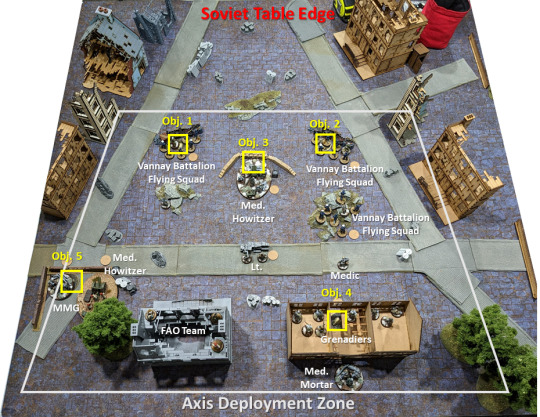
View On WordPress
0 notes
Text
Doom or democratic renewal

In 2001 Tony Blair gave a speech to the newly formed Welsh assembly. In it he said that devolution is ‘just one part of a much wider programme of constitutional reform designed to move us away from a centralised Britain to a more democratic, decentralised, plural state.’ That was 2001 and by that point Blair’s government had already presided over the creation of devolved administrations in Scotland, Wales and Northern Ireland.
Skip ahead nine years and the coalition government, channelling a similar spirit, was ushered to power in part on the strength of David Cameron’s talk about a ‘Big Society’. This was a prospectus that set out to give people and communities a greater stake in public affairs, granting them the powers to run local services (for example, setting up and running schools), and devolving power and a degree of fiscal management to regional government. The same initiative led to the first wave of city mayors. All of which was undertaken to ‘deliver the reform, renewal, fairness and change Britain needs.’
Fast-forward another nine years and lurking behind the Johnson government’s pledge to Get Brexit Done was a goal of ‘levelling up’. More economic in character, it set about trying to cement the government’s newly formed alliance with former redoubts of Labour support by targeting the social, economic, and cultural disparities between the dynamic centres of metropolitan success and parts of the country they had left behind.
So entrenched is this consensus about the need to overcome an unbalanced distribution of success and power that the opposition Labour Party has staked out its own ‘radical’ programme. Here similar ideas aim to crystallise the national potential overlooked by a top-heavy system of government. Through a new constitutional settlement decisions will begin not from Westminster but at the local level, and metro mayors will receive new powers to foster ‘dynamic new clusters’ of regional economic activity as part of a bid for broader economic growth.
It would seem that all the major political parties have been committed to renewing British democracy by way of local empowerment for the last twenty five years. Through the disciplining lens of winning power, they are more or less falling over themselves to win the hearts and minds of constituencies otherwise disillusioned with the way money and government works.
Bolstering the Labour Party’s latest pitch for democratic renewal, the IPPR think tank released a paper in June on ‘Building support for democratic reform’. British democracy, it reports, is in a ‘doom loop’. A majority are dissatisfied, and this forms a general trend over the last twenty years that contrasts with a lively faith in the democratic creed that animated the twilight years of the twentieth century. Commensurate with the decline in satisfaction is an increase in cynicism. Perceptions prevail that an elite has captured the institutions of power, that they don’t represent the country, behave with integrity or deliver for their citizens.
Underlying the pivot between ‘doom’ or ‘democratic renewal’ is a kind of Burkean argument; to conserve institutions with value it is necessary to reform them. If the trends towards disaffection and disillusionment are as pronounced as the evidence suggests, then the case for renewal should be urgent; and perhaps it is this sort of moderate conservatism that has prevailed since the 1990s.
Even so, the ‘doom loop’ has tracked each cycle of reform. Does this mean the reforms haven’t worked? Were they undertaken in bad faith? Or is the consensus just wrong? Certainly, in the eyes of some the ‘Big Society’ was a cynical, rebranding exercise that polished the tarnished reputation of Thatcherite conservatism, just as ‘levelling up’ was a populist manipulation of legitimate democratic grievance for purely opportunistic ends. Even the Labour Party’s current position could be seen as a desperate attempt to win back the voters they lost in 2019, and the rhetoric of renewal a public overture that masks stealthy and tactical tiptoeing towards power.
So is all this talk of renewal an empty piece of sophistry that dissimulates but serves the hard-nosed realpolitik of liberal politics? How many people know anything about their metro mayor? What sort of real power do they have? How far have people felt the impact of the myriad funding projects injected into the marginalised parts of the country? Did anyone care when a small cabal furtively ran a campaign to remove the office of Bristol’s city mayor?
The wide-angled impression has to be that these reforms are only tinkering with an industrial-sized tanker forged from a different era but that continues to define the status quo. This is a vessel with its roots in the politics and economy of the nineteenth century, a ‘big’ world of machine politics and smart, systemic finance. The paradox is that it creates a country divided against itself: an economic system on which wider society ultimately depends but by which it feels alienated, a class of internationalist professionals that the ‘secret people’ of provincial Britain quietly resent. The picture is visible in the architecture of Cotswolds villages: outside the charming centres of postcard country retreats now inhabited by moneyed media magnates and city financiers are new-build estates for the struggling underclass.
Those who have stopped to observe democracy have often noted that it requires more than a simple transaction between the enfranchised and their representatives. It is never just a naked calculation. Communities, associations, the many expressions of civic society – these form the fertile soil from which it flourishes and on which its rude health ultimately depends. Tocqueville saw this clearly in the democratic culture of nineteenth century America, a country at that time shaped by a patchwork of disparate religious communities. Where such an earthy culture is untilled and left to itself, weeds may choke off any good-growing thing.
The situation, as the IPPR report implies, creates different political opportunities. One way is clearly exploitative. The perception of a corrupt elite against a picture of widely divergent economic interests creates a space for short-term demagoguery to press its advantage. Except this doesn’t really solve anything. The only meaningful answer is to deliver a real solution. Which tees up Labour nicely. It allows them to say that the nasty Tories were just using the agenda to mainline their craving for power, but we actually care and will do what it takes to make democratic renewal happen.
Personally, I’m not so sure. Politics, for all its noisy theatrics, rests on deeper structural trends. Behind the potted history of democratic reforms in the last twenty years, is a more fundamental utilitarian and neoliberal consensus. This has conditioned so much in modern Britain, especially since the 1980s but with roots in the 1960s, that it has become something like a reflex movement. It is no longer clear that the civic life of the country exists in the same way as it did in the post-war years. It has been hollowed out.
The recent attempts at democratic reform may just show that we lack the imagination for the sort of renewal that is needed, because our imagination is shaped by an entrenched and altogether different political reality – one that is, at its core, technocratic and indifferent to the peccadilloes of community and human association. Such a reality was always at odds with irreducible characteristics of human nature but the problem has become more pronounced as our machine civilisation has become more advanced.
Which could mean that only by stumbling blindly through a period of pain will any sort of alternative become possible. Some version of doom may have to precede a glimpse of renewal.
1 note
·
View note
Text
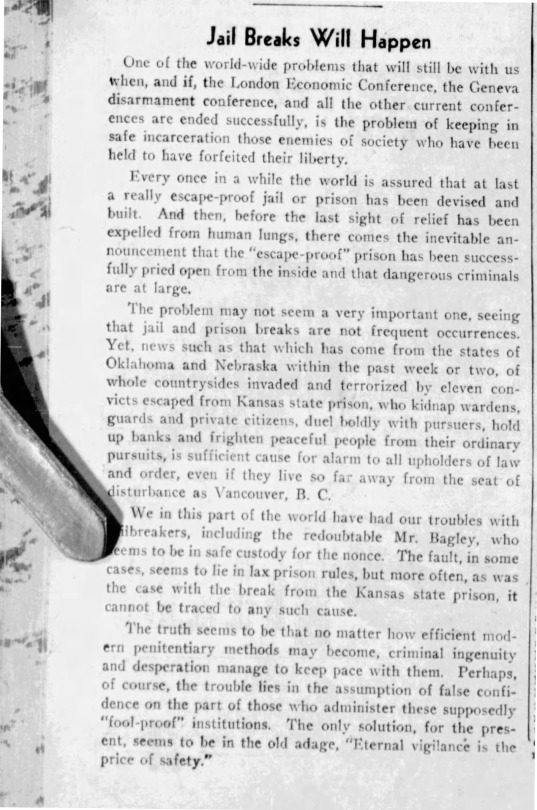
"Jail Breaks Will Happen," Vancouver News Herald. June 10, 1933. Page 4.
----
One of the world-wide problems that will still be with us when, and if, the London Economic Conference, the Geneva disarmament conference, and all the other current conferences are ended successfully, is the problem of keeping in safe incarceration those enemies of society who have been held to have forfeited their liberty.
Every once in a while the world is assured that at last a really escape-proof jail or prison has been devised and built. And then, before the last sight of relief has been expelled from human lungs, there comes the inevitable announcement that the "escape-proof" prison has been successfully pried open from the inside and that dangerous criminals are at large.
The problem may not seem a very important one, seeing that jail and prison breaks are not frequent occurrences. Yet, news such as that which has come from the states of Oklahoma and Nebraska within the past week or two, of whole countrysides invaded and terrorized by eleven convicts escaped from Kansas state prison, who kidnap wardens, guards and private citizens, duel boldly with pursuers, hold up banks and frighten peaceful people from their ordinary pursuits, is sufficient cause for alarm to all upholders of law and order, even if they live so far away from the seat of disturbance as Vancouver, B. C.
We in this part of the world have had our troubles with lawbreakers, including the redoubtable Mr. Bagley, who seems to be in safe custody for the nonce. The fault, in some cases, seems to lie in lax prison rules, but more often, as was the case with the break from the Kansas state prison, it cannot be traced to any such cause.
The truth seems to be that no matter how efficient modern penitentiary methods may become, criminal ingenuity and desperation manage to keep pace with them. Perhaps, of course, the trouble lies in the assumption of false confidence on the part of those who administer these supposedly "fool-proof" institutions. The only solution, for the present, seems to be in the old adage, "Eternal vigilance is the price of safety."
#vancouver#editorial#crime wave#prison break#escape from prison#prison security#menace to society#law and order in canada#prison administration#penal reform#1932 oakalla escape#great depression in canada#crime and punishment in canada#history of crime and punishment in canada#convict revolt
0 notes
Text
0 notes